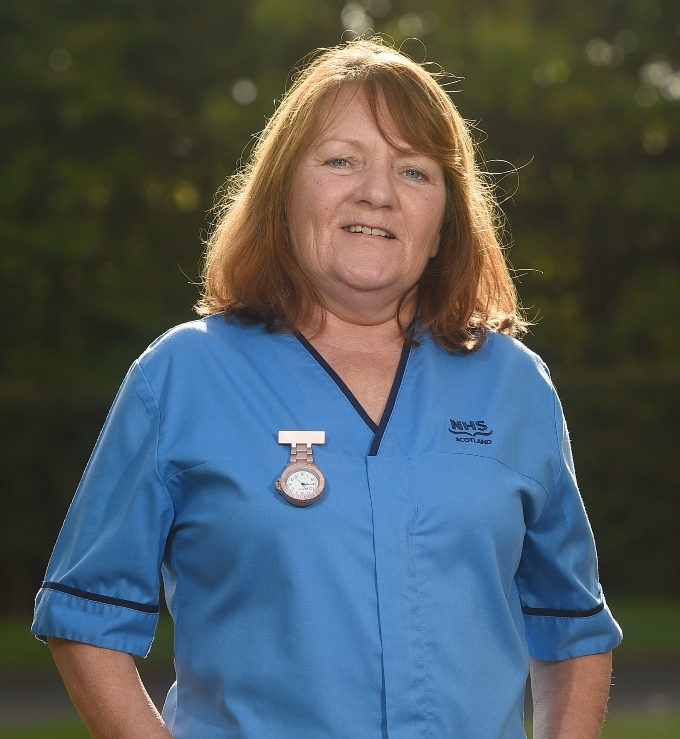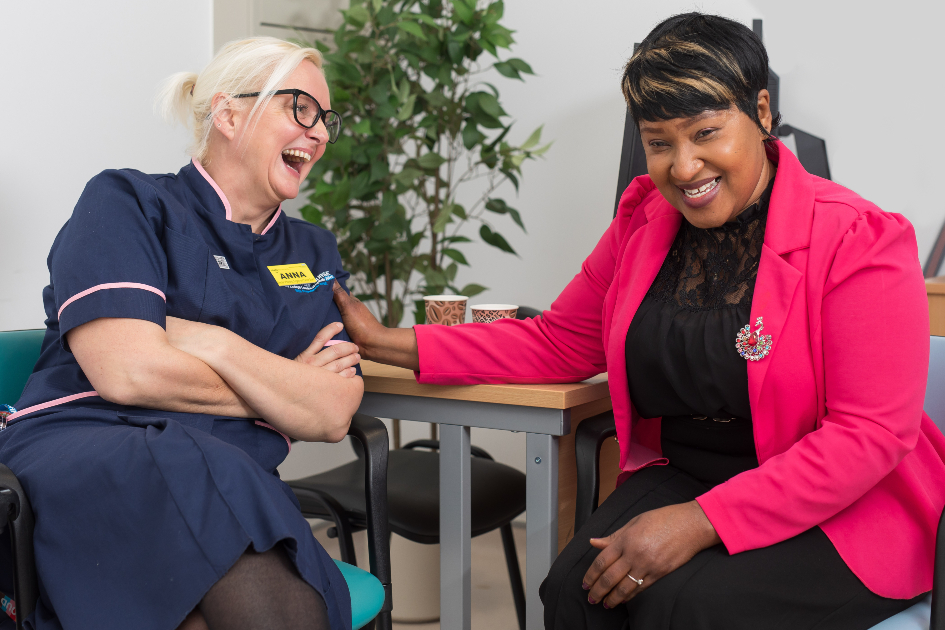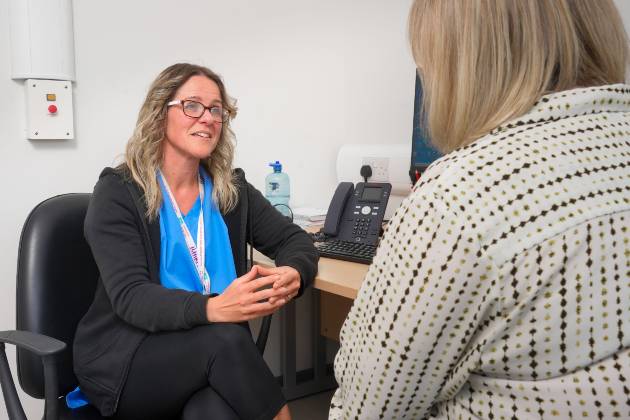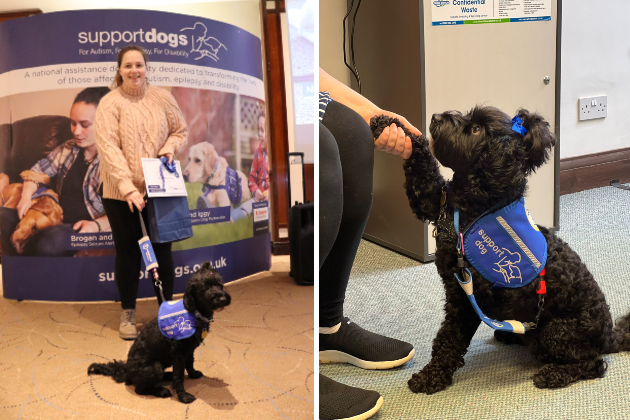RCN steward Hilary Nelson is on a mission to make sure members who wear uniforms at work can get the adaptations they need
When a member contacted RCN steward Hilary Nelson asking for support to procure an adapted uniform, it dawned on Hilary that it wasn’t something she’d thought about before.
Liz, the member, had recently had her lymph nodes removed due to breast cancer and as a result of this and other surgery, was unable to stretch her arms above her head making it difficult for her to put on and take off the NHS Scotland tunic.
“Liz told me that for a while she’d had to come in to work early and find someone to help her get into her uniform,” says Hilary. “Then at the end of her shift, she’d have to wait for someone to help her get out of it. It wasn’t an issue I’d come across previously, but I suddenly realised so many other members could be in a similar position.”
Liz had spoken to her senior charge nurse who had taken on board her concerns but was struggling to find a resolution, so Liz approached Hilary for support.
A long process
“In Scotland, we have a national uniform for NHS staff,” says Hilary. “I spoke to my senior officer and we got hold of the national uniform policy which says that uniforms with adaptations to meet religious or medical needs can be ordered.
“We had to go through occupational health and then put in a request with our procurement team. The tunics only cost £4.50 so it’s not a financial burden, but the process was long and difficult. It took a year; we had to keep chasing the request up and the first set of adapted tunics that arrived were too big which caused a further delay.”
I knew how difficult it was for Liz because there wouldn’t always be someone on shift who she’d feel comfortable asking for help
During this time Liz was still having to ask for help from colleagues and when the COVID-19 pandemic hit, it highlighted how serious the problem was.
“I knew how difficult it was for Liz because there wouldn’t always be someone on shift who she’d feel comfortable asking for help,” says Hilary. “Sometimes on rare occasions, when there wasn’t help available, Liz would have to make the decision to travel home in her uniform.
“With COVID-19 that was no longer an option. We had to go back to procurement and say, this is even more serious now and we need a solution.”
Photo below: Liz (left) and Hilary
I think it took a lot of courage to ask for support. Now Liz feels her dignity has been restored
Dignity at work
Hilary says: “This was very personal for Liz. I think it took a lot of courage to ask for support. Now she feels her dignity has been restored.”
Hilary and Liz want to raise awareness so that members who need adapted uniforms can get support from an early stage. Hilary says: “When we’re representing people, perhaps through sickness absence or other processes, the requirement for an adapted uniform is something we can consider. We can ask that question – will your uniform be ok when you return to work? Will it be comfortable, and will you have any issues taking it on or off?
“It’s also something we can raise awareness about more generally. Nursing staff may need adaptations to their uniform for other reasons, such as religious beliefs, but are people aware that’s an option? I think because we have a national uniform in Scotland, and because it was introduced a while ago, there may be less awareness, especially as a lot of the images we see don’t show adapted versions.”
Liz’s adapted tunic has a zip down the front and tunics with three quarter length sleeves, or full-length sleeves for those not undertaking patient care, are also available. Bespoke adaptations can also be made.
Once I started thinking about it, I realised there were so many other people who could be struggling with their uniform
“If you’re an RCN rep, it’s worth finding out what the process is for ordering these uniforms in your workplace,” says Hilary. “I asked Liz’s senior charge nurse to share all the order numbers and procurement information with me so that we’re not starting from scratch next time. Thankfully, he had the foresight to order five tunics, so Liz has enough.”
Hilary, who has been sharing this experience with other reps in Scotland, wants to raise awareness so that reps across the UK can start these conversations in their workplace and consider how uniforms may be a barrier to work for some members.
“I’ve supported other members who have had female cancers, but I have never thought about this issue before,” says Hilary. “Once I started thinking about it, I realised there were so many other people who could be struggling with their uniform. People in a similar situation to Liz, but also people with musculoskeletal problems, arthritis or previous injuries. I hope this is something we can bear in mind as reps when we’re supporting members and working with employers.
“For members, I think the message is to reach out. If you’re having issues and your manager isn’t giving you the support you need or you feel like you can’t approach them, speak to your local rep because you’re not alone and we can help.”
Words by Zara Davies. Pictures by Greg Macvean
Liz’s view: ‘It’s given me back my self-esteem’
I felt very vulnerable having to ask for assistance to get undressed at work. Sometimes the people in the changing room weren’t my work colleagues so it wasn’t always an easy thing to do.
Often, when I’d ask for help, people would say things like “Oh is your uniform too tight?” which meant I had to relay my story all over again. I felt like I had to tell strangers about my personal experience.

From the time I returned to work, it took a whole year to get this uniform despite it being identified quite early on that I needed it. It took a long time to source the procurement number and then two arrived in the wrong size.
When I first approached my senior charge nurse to tell her I was struggling, she started looking into options but said that I could travel home in my uniform in the meantime. I told her that I wasn’t comfortable doing that because I would be challenged. Then of course, COVID-19 happened, and it was completely out of the question to travel in your uniform.
Shortly after, I got a new senior charge nurse, who alongside Hilary, was on the case with chasing up my request and together they managed to source me five adapted tunics.
When Hilary stepped in, she helped to explain the urgency
Before Hilary was involved, I felt awkward that I had to keep asking if there was any news. When Hilary stepped in, she helped to explain the urgency. She made her presence and why she was supporting me known. Her presence was vital in managing to procure the uniforms and I don’t think I would have managed to get them without her support.
Now I know I can approach Hilary with any concerns and, even if she doesn’t have to intervene, her advice is so helpful. I know she’s there.
My adapted uniform has given me back my self-esteem and empowered me. My advice to other members in a similar situation would be to go and speak to your RCN rep as soon as you can or contact the RCN and get somebody on the case for you.
I hope by sharing my story, it will raise awareness and make it easier for others to ask for support and get hold of the adapted uniforms they need.








